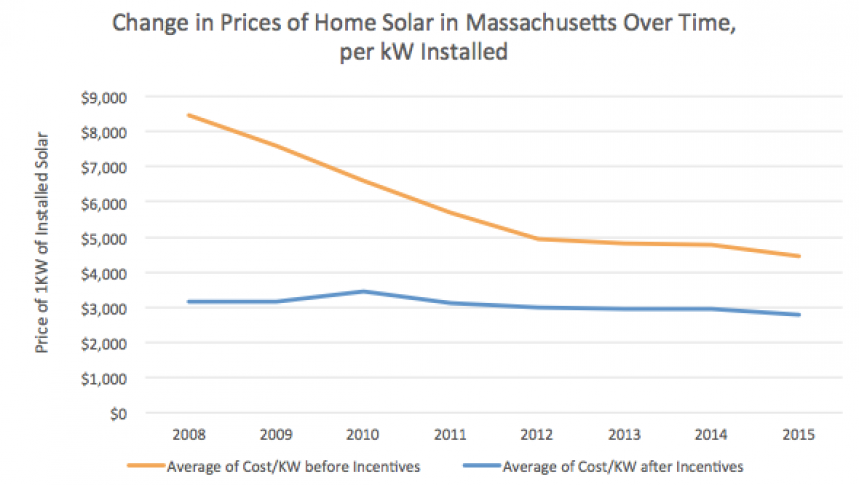Massachusetts Solar Panels
Discover how much you can save today with our solar calculator
Massachusetts Solar – What You Should Know About Solar in the Bay State
The cost of solar in Massachusetts is rising drastically each year. Ranked third in the U.S. for the highest cost of energy, the Bay State’s electricity prices are only behind that of Hawaii and Connecticut. It’s predicted that these costs will continue to rise, leaving many homeowners looking for a sustainable and affordable solution.
Luckily, Massachusetts has a viable alternative: residential solar power.
If you are considering investing in solar panels, learn more on how you can use various rebates and incentives in Massachusetts.
Currently, Massachusetts solar panels produce enough energy to power 131,000 homes! Ranked fourth in the nation for the amount of solar installed over the past year and sixth for its’ cumulative 806 MW of installed solar capacity, it’s clear that solar is here to stay in MA. Not only has the solar industry taken off, it’s also giving homeowners an alternative to traditional energy sources and costs.
The facts
- As of June 2015, the cost of energy in MA is 52 cents per kilowatt hour
- The cost of energy has increased by 9 cents over the past year
- In 2014 alone 50,000 Massachusetts homes have installed solar energy
- The estimated savings over the lifetime of a system is an astounding $10,000-30,000
The Cost of Solar Panels in Massachusetts
Average cost to purchase solar in MA in 2015: $20,180
This is the price you would be paying after the incentives and rebates have been applied. The price of solar has decreased substantially over the past decade.
Keep in mind that Massachusetts’ progressive solar policy have allowed for the creation of many incentives, loans and grant programs, which can further offset your initial cost. In addition, Massachusetts supports net metering – a policy which directs utilities to credit a homeowner for any additional energy their panels produce that they don’t need.
There has never been a better time to go solar in Massachusetts
Since 2013, solar prices have decreased by 40%
Solar prices have dropped drastically over the past few years, and are still going down.
Why are the prices for solar decreasing?
The price of manufacturing solar panels and equipment has dropped, which in turn decreases the cost of Massachusetts solar systems. In addition, the technology continues to advance, making installation time shorter and more convenient for homeowners.

Average system size has increased by 81% since 2008!
The size of the average home solar system has almost doubled in size over the past 7 years. Today, the average system size in Massachusetts is 7.4 kW, compared to 4.1 kW in 2008. Installation sizes have increased so much over the past few years because solar has become much more affordable. Larger systems are now financially feasible and can provide more power for your home.
Why are so Many Massachusetts Homeowners Switching to Solar?
- Massachusetts has the third most expensive energy prices in the country!
- Current average energy costs across the country are 12.93 cents per kilowatt hour
- In Massachusetts, energy costs 19.52 cents per kilowatt hour
Choosing solar makes sense, especially if you live in Massachusetts since the state currently has the third highest rate for energy in the entire country.
Even more alarming: the 19.52 price reflects a rising cost. In June of 2014, MA residents were only paying 16.62 cents per kilowatt hour. Seeing the cost of energy increase by 17% in just one year is a staggering statistic, and it emphases the reality of skyrocketing energy prices.
How Can Solar Benefit Homeowners in Massachusetts?
MA residents stand to save more because they already spend more on their electricity bills. All energy needs are not equal for every region, and all energy costs are not equal across the U.S. For example, homeowners in MA need to heat their homes during the winter, which requires more energy than homes in the more temperate Southwestern states. North easterners also may need to have lights on indoors on cloudy days, a rarity for the sunnier states.
Residents in Massachusetts are already paying more for electricity, and may be using more on average per year than for example, California. As a result, those who switch to solar in MA are likely to see greater energy savings, regardless of whether their installation covers all or a majority of their energy needs.
This is the single most important factor to consider when evaluating your solar options, and one that many people in the northern states may not realize.
What are the Financial Benefits of Installing Solar in Massachusetts?
- Get financial help to fund your switch to solar power
- Utilities, financial institutions and the state and federal governments have programs in place to mitigate the initial cost of the solar installation. Some of these initiatives, such as net metering, can even put money back in your pocket.
- Enjoy significant energy savings for your home
- The amount you will save depends on the type of financing method you choose – purchasing your system outright will give you the biggest rewards over the solar panels’ lifetime. In general, regardless of the type of payment you choose, you can expect to see between $5,000 and $30,000 in savings over the course of 20 years!
- Increase the value of your home or property
- Many people voice concern over what will happen to the panels or their investment if they move within the next 20-30 years. In January of 2015, the U.S. Department of Energy’s reported an increase of $15,000 in sale price of homes with solar panels in Massachusetts over those without. This lowers any risk associated with your initial investment because the system will end up paying for itself even if you move.
- Support the development and growth of this new job market
- Currently there are at least 9,400 solar jobs in the state of Massachusetts
- MA is ranked second in the country for solar industry employment
- As the popularity of solar increases, the job market will continue to grow as well
- Solar helps the economy in Massachusetts
- With every dollar invested in solar power, it creates an economic benefit worth $1.20 for the local community
How Much Solar Potential Does Massachusetts Really Have?
Before deciding if solar panels are the right financial fit for your wallet, it’s a good idea to understand what affects the level of energy produced by your solar panels. The essential questions to consider are: how much energy will you be able to produce and how much money will you subsequently save?
All areas do not receive equal insolation. Solar insolation is the measurable amount of energy that is received by the sun. It’s also a deciding factor for how much energy you could produce with solar panels on your home. Massachusetts receives approximately 4-5 kilowatts per hour. In comparison, the Southwestern United States receives over 5 kilowatts per hour. While this is higher than that in MA, it’s not a dramatic difference, and it’s important to understand that solar panels in the northeast can still be productive enough to cover many homes’ energy needs.
One of the great things about solar energy is that it’s a viable option even when solar insolation is on the lower end.
Creating Affordable Solar Energy in Massachusetts
Massachusetts has welcomed solar power. In order to help make the transition even more attractive and attainable, the state and federal governments have provided multiple incentives and tax breaks for property owners who decide to install solar power in Massachusetts.
- Residential Renewable Energy Tax Credit: The federal government will provide a tax credit of 30% for qualified costs created from your solar installation.
- Residential Energy Conservation Subsidy Exclusion The federal government will not tax any subsidy funds you receive from a public utility for installing solar equipment onto a residential structure. In other words, the subsidy amount will not be included in your gross income, so you won’t be taxed on it.
- Residential Renewable Energy Income Tax Credit: The state of Massachusetts will give you a 15% tax credit up to $1000 on your income tax for the total cost of your residential solar installation.
- Renewable Energy Property Tax Exemption: For 20 years after installing solar panels, no Massachusetts property taxes will be applied to the equipment. Although your property value will increase by installing solar, you won’t have to pay any extra taxes on the added value.
- Renewable Energy Equipment Sales Tax Exemption: The state of Massachusetts won’t charge sales tax on any solar power equipment for your home.
- Net Metering: Massachusetts solar installations may generate more energy than a home needs. When this happens, the utility companies pay for that extra power. If you own the panels, your utility will pay you for any extra energy your system produces.
- Utility and Municipality rebate programs: Many utilities also offer their own rebates above and beyond what the state and federal governments have to offer
This is by no means a conclusive list of the benefits and incentives available for converting to solar in Massachusetts, but it gives you a good idea of the main incentives and rebates that are available to homeowners.
How to Pay for your Home Solar Panels in Massachusetts
If you’re unsure whether you want to purchase solar panels outright, check out the other ways you can fund your switch to solar.
There are a variety of financing options available to homeowners who are interested in installing solar panels in Massachusetts. Here, we briefly cover your choices:
- Cash Purchase: pay everything up front, you own the panels and the energy they produce, and are able to keep any tax incentives or rebates
- Loan: with ownership as the goal, you would take out a loan for the money to cover the installation of your system. The incentives and grants are available to you since you’re still buying the panels
- Lease: when you lease solar panels, all the energy they produce is yours, but you don’t own the panels. You will pay a monthly bill for the panels, like you would for a leased car, and you will still reap the benefits of a diminished or absent utility bill. The solar company will maintain and service the panels as needed.
- PPA (Power Purchase Agreements): the solar company will install the panels on your roof and maintain ownership of them. As part of this agreement, you are able to purchase the energy the panels produce at a much lower rate than if you were buying it from a utility. Here, you’re paying for the energy you use, not the panels or their maintenance.
Thankfully, the Bay State supports all of these payment choices for residential solar power. Having a variety of options to choose from makes the switch to solar much simpler and more affordable than ever before. The more people move towards solar in Massachusetts, the cleaner and cheaper the energy available state-wide becomes.
Ready to See How Much You Can Save with Solar?
Interested in getting exact prices for the cost solar for your home? Get competitive solar quotes from qualified, trusted installers in your area. To see an estimate for how much you could expect to save and how much a solar system would cost, try our solar calculator.




